Is the recorder a good starter instrument for my child?
Yes, no and maybe. It all depends on your child and what they want to play – if they even want to play an instrument at all!
A child might not necessarily want to do something just because you think it is “good” for them. This applies to forcing them to love Latin, kale or Mozart. As a recorder teacher I used to be bombarded by kids being sent by their parents to learn the recorder (often called flute, to my flautist friends’ disgust) before they were allowed to move onto a “real” instrument. I would kindly thank the parents for calling and tell them that I only teach students who want to learn one of my offered instruments with me. I also tell them that I have studied this instrument for many years at university and that it is indeed a serious instrument.
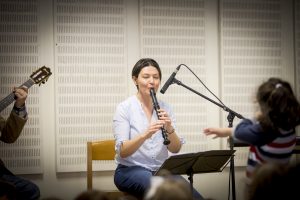 My recorder-playing adventure began at age 7. At a glance, it may seem a very simple, toy-like whistle with a few holes. However, once you pick one up and try to make a beautiful sound, you may notice it is very easy to produce a sound, but to intuitively know which hand goes where, how to place the fingers, how to get a sound without squeaks and play in tune… Aha, not so simple after all! Playing the recorder requires attention and coordination, just like any other music instrument.
My recorder-playing adventure began at age 7. At a glance, it may seem a very simple, toy-like whistle with a few holes. However, once you pick one up and try to make a beautiful sound, you may notice it is very easy to produce a sound, but to intuitively know which hand goes where, how to place the fingers, how to get a sound without squeaks and play in tune… Aha, not so simple after all! Playing the recorder requires attention and coordination, just like any other music instrument.
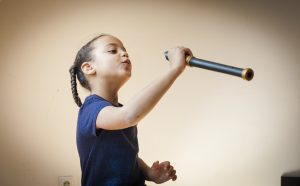 If your child does not like their initial contact with the recorder and he/she/they are not curious to hold an instrument for a few minutes: this is probably the wrong instrument for them. This goes for all instruments: violin, tuba, guitar, pennywhistle, harp, drums, etc. If there is no genuine interest in discovering how the instrument works, there will be little intrinsic motivation to spend the required hours and energy on learning it.
If your child does not like their initial contact with the recorder and he/she/they are not curious to hold an instrument for a few minutes: this is probably the wrong instrument for them. This goes for all instruments: violin, tuba, guitar, pennywhistle, harp, drums, etc. If there is no genuine interest in discovering how the instrument works, there will be little intrinsic motivation to spend the required hours and energy on learning it.
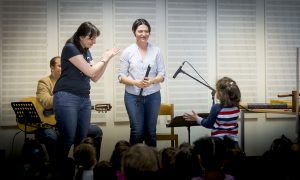 So how do you find the right instrument for your child? You don’t: your child does. You need to provide opportunities for maximum music exposure. Take them to concerts, show them YouTube videos, take them to free try-out lessons or open houses of music schools or concert venues. Often music universities allow free entrance to Class Concerts or Exam Recitals. Please choose a seat with easy access so you can whisk your child out quickly if they desperately need the toilet or start making a noise. Bearing in mind, it is also good practice for us musicians to have to cope with noisy patrons at times. Maybe not so pleasant for the audience, though.
So how do you find the right instrument for your child? You don’t: your child does. You need to provide opportunities for maximum music exposure. Take them to concerts, show them YouTube videos, take them to free try-out lessons or open houses of music schools or concert venues. Often music universities allow free entrance to Class Concerts or Exam Recitals. Please choose a seat with easy access so you can whisk your child out quickly if they desperately need the toilet or start making a noise. Bearing in mind, it is also good practice for us musicians to have to cope with noisy patrons at times. Maybe not so pleasant for the audience, though.
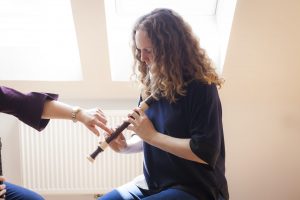 Recorders are a lot more reasonably priced than other woodwind instruments, which may make it less of a financial risk than picking up the harp or piano. Oh, and that silly name, “recorder” was first mentioned in 1388 in an inventory of instruments in Derby, England. In addition, the word recorder is also related to the Italian verb “recordare” meaning to commit to memory and a fun fact: it was used to teach birds how to learn tunes which were played to them on the recorder. The things people did to amuse themselves a few hundred years ago!
Recorders are a lot more reasonably priced than other woodwind instruments, which may make it less of a financial risk than picking up the harp or piano. Oh, and that silly name, “recorder” was first mentioned in 1388 in an inventory of instruments in Derby, England. In addition, the word recorder is also related to the Italian verb “recordare” meaning to commit to memory and a fun fact: it was used to teach birds how to learn tunes which were played to them on the recorder. The things people did to amuse themselves a few hundred years ago!
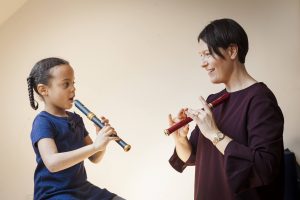 The recorder is made of a whole family of different sized instruments and children usually start with the soprano/descant recorder while adults often prefer the mellow sound of the alto/treble recorder. But I don’t mind if you want to start with the bass or sopranino! Follow your heart (and maybe the size of your hands and wallet, too). I hope this gave you the motivation to make an appointment to let your child come and try out this beautiful instrument. Or maybe you are curious to come and give it a whirl yourself?
The recorder is made of a whole family of different sized instruments and children usually start with the soprano/descant recorder while adults often prefer the mellow sound of the alto/treble recorder. But I don’t mind if you want to start with the bass or sopranino! Follow your heart (and maybe the size of your hands and wallet, too). I hope this gave you the motivation to make an appointment to let your child come and try out this beautiful instrument. Or maybe you are curious to come and give it a whirl yourself?

